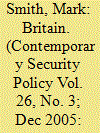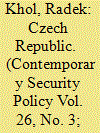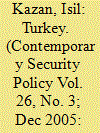| Srl | Item |
| 1 |
ID:
072793


|
|
|
|
|
| Publication |
2005.
|
| Summary/Abstract |
This article highlights four key aspects of British ballistic missile defence policy. These are, first, the Anglo-American connection; second, the participation in American-led 'coalitions of the willing'; third, the role of NATO; and, fourth, the role of the defence industry. These four factors operate inside a strategic culture of 'instinctive Atlanticism' coupled with a Europeanist trend in recent years. Developments in the United States are likely to be more influential in British policy than missile proliferation. An American offer of BMD coverage of the UK homeland, perhaps as part of the American system, might be attractive, but the lack of a strong pro-missile defence constituency in Britain, other than in the defence industry, probably means that it is only in this context that London would make such a decision.
|
|
|
|
|
|
|
|
|
|
|
|
|
|
|
|
| 2 |
ID:
072794


|
|
|
|
|
| Publication |
2005.
|
| Summary/Abstract |
Missile defence is an issue in Czech politics that touches upon the roots of Czech security policy, and combines its vital NATO and US bilateral dimensions. Several factors clearly come into play in explaining the main sources of the debate and the actual course of Czech missile defence policy. Pragve's foreign and security policy is determined by Atlanticist motives, intra-Alliance solidarity and a pragmatic approach towards a project seen as a top priority for the Bush administration. However, the Czech government must be cautious in its missile defence policy as Parliament has considerable influence over the security and defence policy domain. Its core power rests with the constitutional requirement for approval of any stationing of foreign troops on Czech territory, including missile defence installations. As the Czech political scene is divided on this issue we can expect a heated debate on missile defence in the future.
|
|
|
|
|
|
|
|
|
|
|
|
|
|
|
|
| 3 |
ID:
072812


|
|
|
|
|
| Publication |
2005.
|
| Summary/Abstract |
In explaining Turkish missile defence policy-making, old theoretical stand-bys like regime type and the Military-Industrial Complex fall short. They leave unexplained major questions such as why the issue of missile defence has not been debated on the same scale compared with many other security issues, and why the issues of Theatre Missile Defence and National Missile Defense have been perceived very differently. The acquisition of a TMD system is seen as a legitimate Turkish priority, whereas the American NMD project has led to scepticism, both publicly and officially. It is concluded that post-Cold War geopolitical factors, as well as security perceptions, foreign and defence policy culture, and military alliance relations all play an important role in Turkish missile defence policy-making.
|
|
|
|
|
|
|
|
|
|
|
|
|
|
|
|